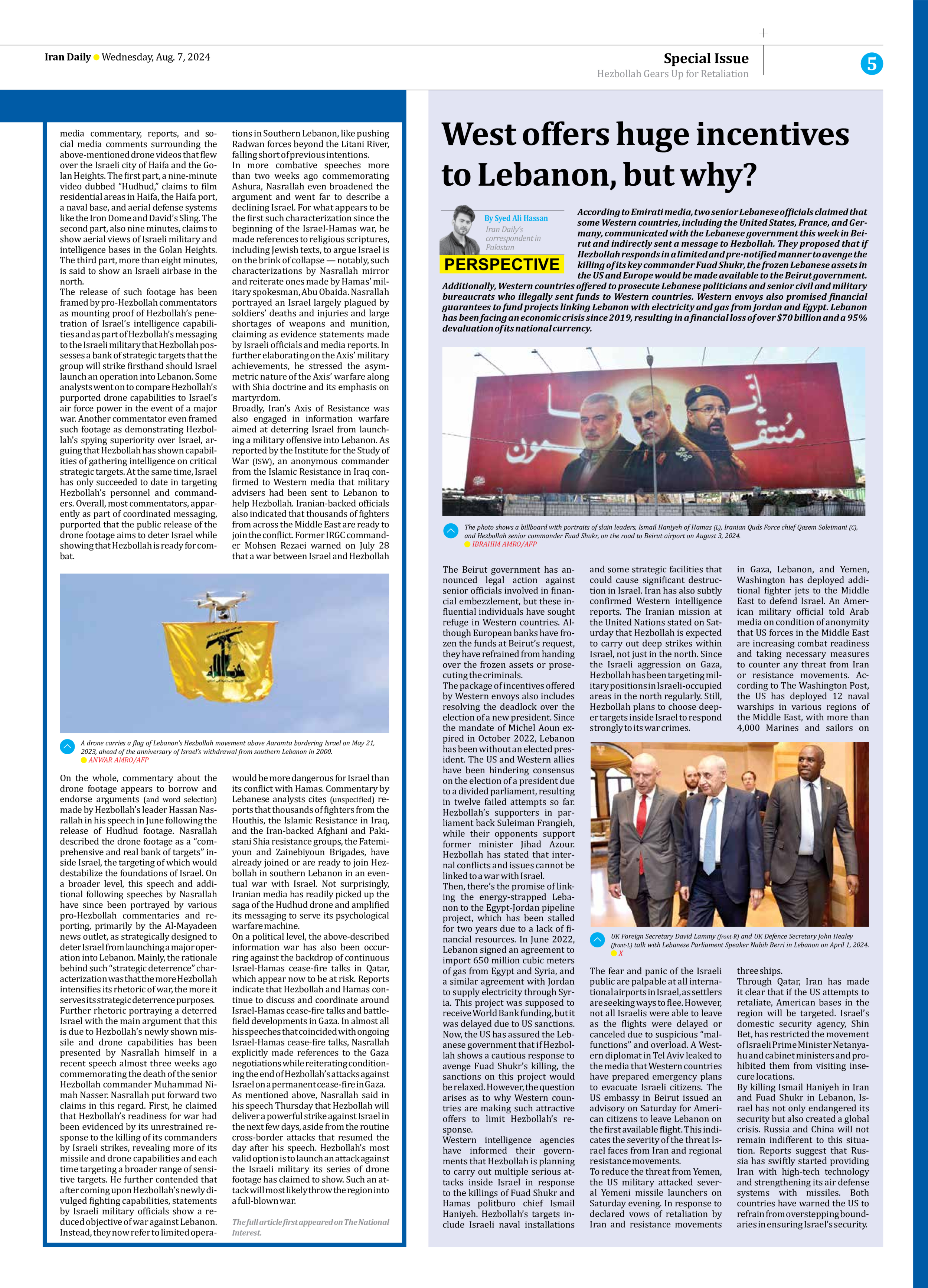
West offers huge incentives to Lebanon, but why?
According to Emirati media, two senior Lebanese officials claimed that some Western countries, including the United States, France, and Germany, communicated with the Lebanese government this week in Beirut and indirectly sent a message to Hezbollah. They proposed that if Hezbollah responds in a limited and pre-notified manner to avenge the killing of its key commander Fuad Shukr, the frozen Lebanese assets in the US and Europe would be made available to the Beirut government. Additionally, Western countries offered to prosecute Lebanese politicians and senior civil and military bureaucrats who illegally sent funds to Western countries. Western envoys also promised financial guarantees to fund projects linking Lebanon with electricity and gas from Jordan and Egypt. Lebanon has been facing an economic crisis since 2019, resulting in a financial loss of over $70 billion and a 95% devaluation of its national currency.
By Syed Ali Hassan
Iran Daily’s correspondent in Pakistan
The Beirut government has announced legal action against senior officials involved in financial embezzlement, but these influential individuals have sought refuge in Western countries. Although European banks have frozen the funds at Beirut’s request, they have refrained from handing over the frozen assets or prosecuting the criminals.
The package of incentives offered by Western envoys also includes resolving the deadlock over the election of a new president. Since the mandate of Michel Aoun expired in October 2022, Lebanon has been without an elected president. The US and Western allies have been hindering consensus on the election of a president due to a divided parliament, resulting in twelve failed attempts so far. Hezbollah’s supporters in parliament back Suleiman Frangieh, while their opponents support former minister Jihad Azour. Hezbollah has stated that internal conflicts and issues cannot be linked to a war with Israel.
Then, there’s the promise of linking the energy-strapped Lebanon to the Egypt-Jordan pipeline project, which has been stalled for two years due to a lack of financial resources. In June 2022, Lebanon signed an agreement to import 650 million cubic meters of gas from Egypt and Syria, and a similar agreement with Jordan to supply electricity through Syria. This project was supposed to receive World Bank funding, but it was delayed due to US sanctions. Now, the US has assured the Lebanese government that if Hezbollah shows a cautious response to avenge Fuad Shukr’s killing, the sanctions on this project would be relaxed. However, the question arises as to why Western countries are making such attractive offers to limit Hezbollah’s response.
Western intelligence agencies have informed their governments that Hezbollah is planning to carry out multiple serious attacks inside Israel in response to the killings of Fuad Shukr and Hamas politburo chief Ismail Haniyeh. Hezbollah’s targets include Israeli naval installations and some strategic facilities that could cause significant destruction in Israel. Iran has also subtly confirmed Western intelligence reports. The Iranian mission at the United Nations stated on Saturday that Hezbollah is expected to carry out deep strikes within Israel, not just in the north. Since the Israeli aggression on Gaza, Hezbollah has been targeting military positions in Israeli-occupied areas in the north regularly. Still, Hezbollah plans to choose deeper targets inside Israel to respond strongly to its war crimes.
The fear and panic of the Israeli public are palpable at all international airports in Israel, as settlers are seeking ways to flee. However, not all Israelis were able to leave as the flights were delayed or canceled due to suspicious “malfunctions” and overload. A Western diplomat in Tel Aviv leaked to the media that Western countries have prepared emergency plans to evacuate Israeli citizens. The US embassy in Beirut issued an advisory on Saturday for American citizens to leave Lebanon on the first available flight. This indicates the severity of the threat Israel faces from Iran and regional resistance movements.
To reduce the threat from Yemen, the US military attacked several Yemeni missile launchers on Saturday evening. In response to declared vows of retaliation by Iran and resistance movements in Gaza, Lebanon, and Yemen, Washington has deployed additional fighter jets to the Middle East to defend Israel. An American military official told Arab media on condition of anonymity that US forces in the Middle East are increasing combat readiness and taking necessary measures to counter any threat from Iran or resistance movements. According to The Washington Post, the US has deployed 12 naval warships in various regions of the Middle East, with more than 4,000 Marines and sailors on three ships.
Through Qatar, Iran has made it clear that if the US attempts to retaliate, American bases in the region will be targeted. Israel’s domestic security agency, Shin Bet, has restricted the movement of Israeli Prime Minister Netanyahu and cabinet ministers and prohibited them from visiting insecure locations.
By killing Ismail Haniyeh in Iran and Fuad Shukr in Lebanon, Israel has not only endangered its security but also created a global crisis. Russia and China will not remain indifferent to this situation. Reports suggest that Russia has swiftly started providing Iran with high-tech technology and strengthening its air defense systems with missiles. Both countries have warned the US to refrain from overstepping boundaries in ensuring Israel’s security.







